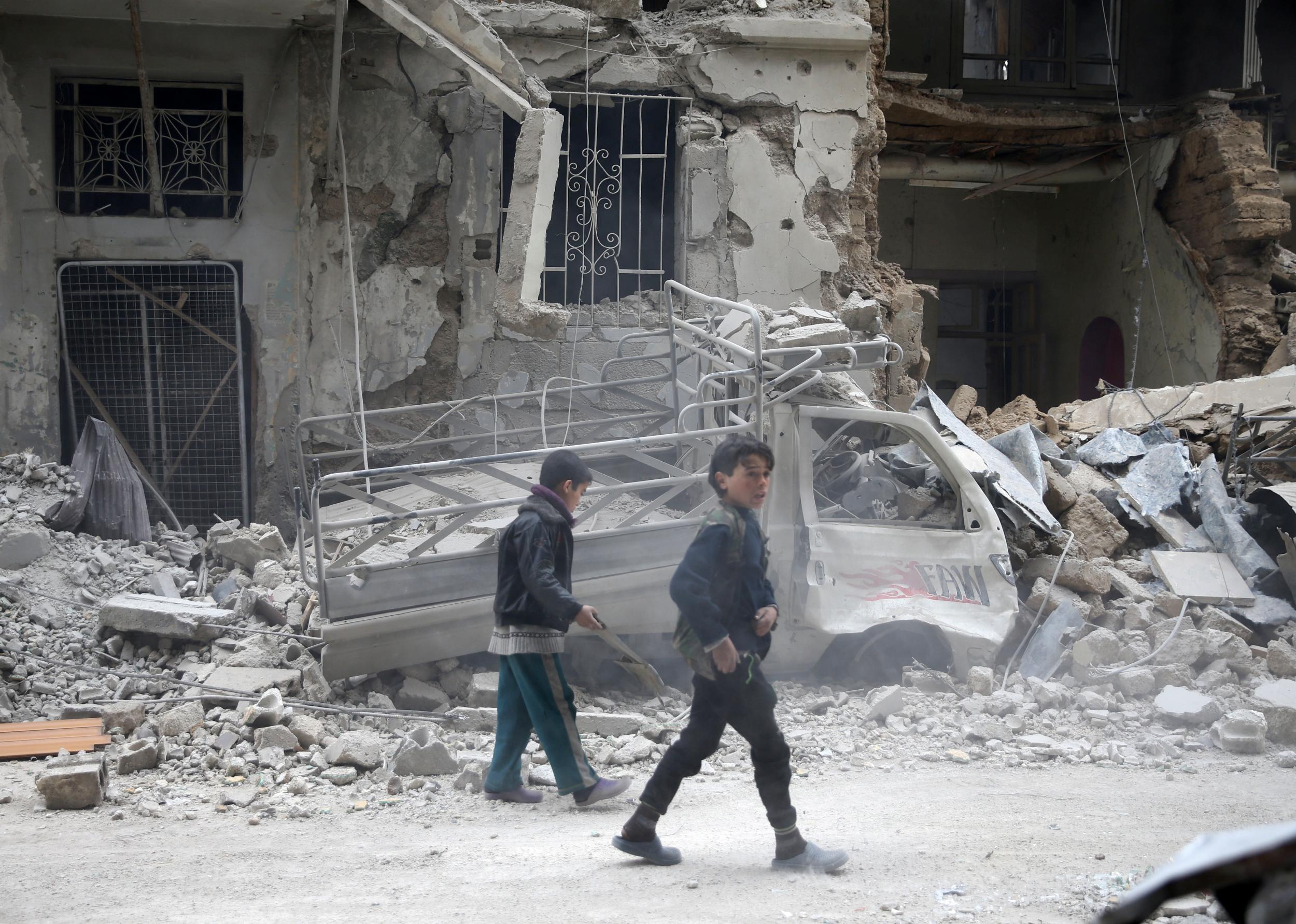Instead of winding down, why is Syria's war getting worse?

Your support helps us to tell the story
From reproductive rights to climate change to Big Tech, The Independent is on the ground when the story is developing. Whether it's investigating the financials of Elon Musk's pro-Trump PAC or producing our latest documentary, 'The A Word', which shines a light on the American women fighting for reproductive rights, we know how important it is to parse out the facts from the messaging.
At such a critical moment in US history, we need reporters on the ground. Your donation allows us to keep sending journalists to speak to both sides of the story.
The Independent is trusted by Americans across the entire political spectrum. And unlike many other quality news outlets, we choose not to lock Americans out of our reporting and analysis with paywalls. We believe quality journalism should be available to everyone, paid for by those who can afford it.
Your support makes all the difference.The fall of the eastern rebel-held side of Aleppo at the end of 2016 marked a turning point in Syria’s civil war, shifting the tide of the conflict in President Bashar al-Assad’s favour.
With Isis’s caliphate dismantled after the battle for Raqqa last year, the other long-standing front in the Syrian theatre also began to wind down.
And yet, on the eve of its seventh anniversary, Syria’s war shows no sign of stopping. In some areas it is becoming even more complicated – and deadly. On Monday, the UN said the country is currently experiencing “some of the worst fighting of the entire conflict”.
Syria today is better described as several intersecting wars, rather than the government-versus-rebels narrative it started out as in 2011. In the last few weeks, the proxy conflicts between Israel and Iran and Turkey and the Kurds have heated up in particular.
Israel vs Iran
Israel lost a fighter jet on 10 February when Syrian anti-aircraft systems shot down an F-16 fighter on its return from a bombing raid.
Though formally neutral on Syria’s civil war, Israel is believed to have carried out more than 100 strikes to prevent weaponry shipments to Lebanese militant organisation Hezbollah, which, along with troops belonging to Shia militias from Iran and Iraq, fights alongside Mr Assad’s troops.
Iran’s political influence over the Assad government is a major worry for Israel, who accuse Tehran of trying to use Syria as a new military base from which it could attack the Jewish state.
The downing of the jet was seized upon as a symbolic victory by the Assad government and its allies – although Israel responded with its most aggressive bombing attack in years, which reports say killed six regime-allied fighters.
The Eurasia Group, a New York-based political risk consultancy, said on Monday that Israel will probably need to continue to carry out strikes in Syria as a means of deterrence, but added that “in a fog of war environment, another incident can easily drag the relevant parties towards a regional conflict”.
Turkey vs Kurds
Turkey, incensed by renewed US support for Kurdish forces in Syria, last month launched Operation Olive Branch on the Syrian Kurdish enclave of Afrin, opening a new front in the war which has already killed dozens of civilians and fighters on both sides.
The Kurds in the north of the country took advantage of the chaos in Syria after 2011 to create a semi-autonomous state.
Turkey views the Syrian-Kurdish People’s Protection Units, or the YPG, as an extension of the Kurdistan Workers Party (PKK) of south-west Turkey, which is designated as a terrorist organisation by Ankara as well as by the US and EU.
However, the YPG and broader Arab-Kurdish coalition Syrian Democratic Forces (SDF) have won widespread Western support over the past few years as the most effective ground force against Isis.
The conflict could bring Turkey, a key Nato member, directly into conflict with the US if Turkish-backed forces make good on their threat to move east towards Manbij, where US troops are based.
The new fighting has also pushed the Kurds towards the Assad government, with whom it has at times formed realpolitik military alliances.
Assad vs Rebels
Turkey, Russia and Iran agreed to create four “de-escalation zones” in Syria in May 2017 to calm fighting between rebel groups and Syrian government forces.
But in recent weeks Mr Assad has moved decisively to crush two of those areas – Idlib, the last remaining rebel bastion, located in the north-west, and Eastern Ghouta, a besieged rebel-held suburb of Damascus.
With the help of its allies in Russia, Syria has launched a ferocious new wave of bombings in both areas. The violence has been some of the worst of the entire conflict, leaving hundreds dead and first responders struggling to cope.
Syria’s opposition is now divided and weak and has lost the full-throated support of the US and Turkey.
While the UN has repeatedly called for an immediate humanitarian ceasefire, based on past strategy in the war it seems probable the Assad government will push on with the offensives.
Subscribe to Independent Premium to bookmark this article
Want to bookmark your favourite articles and stories to read or reference later? Start your Independent Premium subscription today.
Join our commenting forum
Join thought-provoking conversations, follow other Independent readers and see their replies
Comments